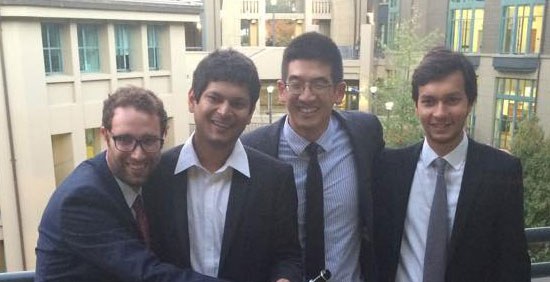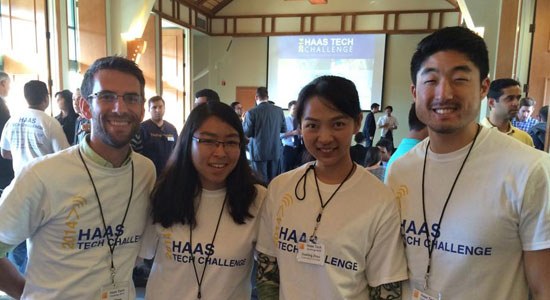Dell, Intel and Booz Allen Hamilton sponsored the 4th annual technology case competition with Haas Business School at UC Berkeley last weekend. MBA teams came from around the country to tackle the topic of Smart Cities by selecting a specific area of application such as smart transportation systems, smart energy use, smart public safety or another area of municipal responsibility.
The student teams were asked to show how Internet of Things (IoT) projects could provide value in the public sphere, as well as to our respective organizations. We wanted to see how they prioritized issues. We wanted specific, feasible recommendations that considered resource constraints and stakeholder needs. We asked for innovation, with presentations that were well structured, creative and engaging. And they had until midnight to crack the case.
The next day, we judged the results and were impressed by the depth and breadth of analysis and focused recommendations. The winning team (above) was the home team – Haas Business School (Go Bears!) They presented an e-parking solution for the San Francisco Financial District, based on studies that show drivers seeking parking account for 30 percent of traffic. Their solution of showing citizens where parking was available would not only save individuals time, but would reduce overall congestion. They included an interesting gamification aspect that provided incentives to use public transportation and share information about upcoming parking availability. Importantly, they included a development platform on which to build a number of additional solutions to improve lighting, public safety and pollution levels.
Other teams provided a range of insights and ideas. The number two team, Kellogg, sketched out a connected street lamp solution in which lamp posts became gateways, sensing and communicating streams of data on traffic, both vehicular and pedestrian, which could be packaged and sold to commercial entities.
Several teams tackled water issues driven by the drought in California and leaky pipes from aging infrastructure, including the 3rd place team from UCLA Anderson. The billions of dollars in economic value estimated in these cases are profound.
It was energizing to chat with students afterwards and hear of their interest in post MBA careers in technology. These Millennial students – who grew up in a connected world – see great opportunity to instrument our cities and help them become more efficient, safer and more convenient.
Haas Tech Challenge co-chairs Charles Guo & Will Lynn were pleased with the results.
“The IoT theme is among the hottest trends in technology; Haas Tech Challenge was thrilled to bring together such an amazing group of sponsors and students,” shared Charles.
My colleagues from Intel and Booz Allen and I left Berkeley with new ideas around how workable business models could form around Smart Cities, and how technology could cascade from one use case to another, driving needed scale. Thank you to Haas and all the MBA teams that participated!


